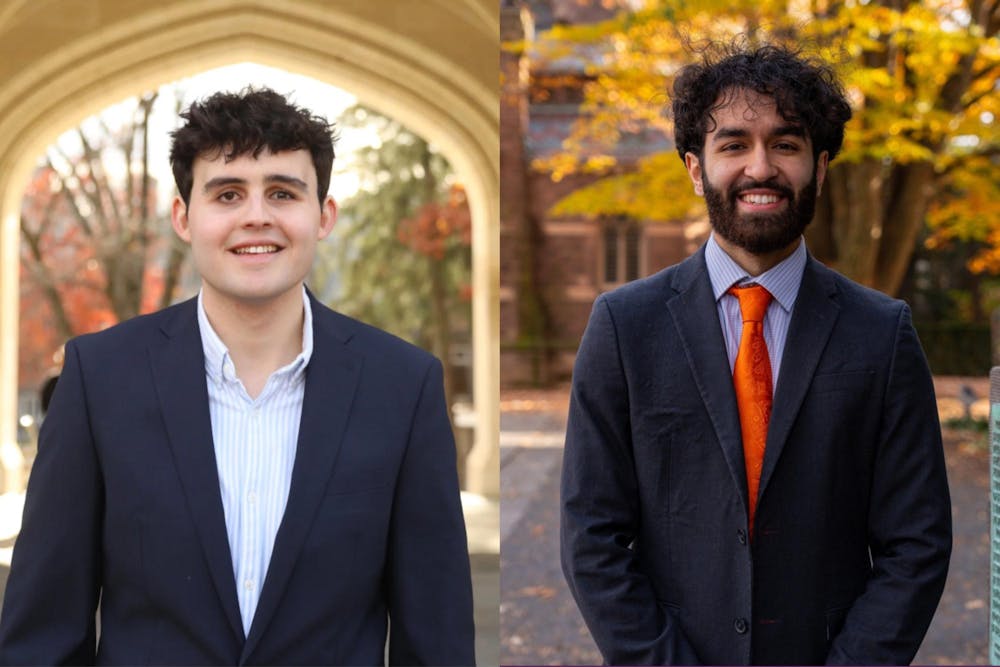All but two positions in the upcoming Undergraduate Student Government (USG) winter elections are contested, with two large tickets headed by presidential candidates Aum Dhruv ’27, the current Social Committee Chair, and Quentin Colón Roosevelt ’27, the current Treasurer.
Dhruv is a staff Audience creator for the ‘Prince.’
Public campaigning began on Monday, and while only Dhruv has partnered with a vice-presidential candidate, both he and Colón Roosevelt have partnered with several down-ballot candidates in their platforms. While all candidates can choose to campaign with others, they will appear individually on the ballots. Current USG President Enzo Kho ’26 and Vice President Aishwarya Swamidurai ’26 were elected last winter despite running on separate tickets.
Students will vote on 16 positions for the Senate: president, vice president, treasurer, seven committee chairs, and six class senators, elected to calendar-year terms. Voting will run from noon on Nov. 24 to noon on Nov. 26.
In interviews with The Daily Princetonian, Colón Roosevelt and Dhruv outlined their goals for the campaign. The two candidates largely agreed on big-picture issues, including the recent changes to independent dining, USG’s relationship with Nassau Hall, and engaging students on a historically apathetic campus.
Colón Roosevelt told the ‘Prince’ that his campaign is driven by a conviction that USG must become a more assertive and representative advocate for students. Reflecting on the University’s recent dining plan changes, he argued that the organization has not effectively communicated student concerns.
“Given what we’ve seen with dining, I think USG has shown to be sort of an ineffective advocate for students,” he said.
Dhruv said that his campaign is driven by a belief that USG must shift from being “reactive to proactive." He shared Colón Roosevelt’s belief that the organization lacks proper undergraduate representation at the administrative level.

“I’ve seen how much students care and how often decisions can be made without their input,” Dhruv told the ‘Prince.’ “That’s not fair to the student body.”
His campaign proposes creation of permanent working groups — including a dining working group within the Undergraduate Student Life Committee (USLC) — that would bring Interclub Council, co-op, and independent leaders into monthly meetings with administrators. Colón Roosevelt, meanwhile, has proposed organizing independents into an advisory board.
Dhruv also plans to require public follow-ups after major University announcements through USG town halls and surveys, and to publish a weekly USG presidential report tracking initiatives and meetings to increase transparency. “Students should be able to see what’s happening and hold both USG and the administration accountable in real time,” he added.
Colón Roosevelt pointed to his recent involvement in responding to the dining plan changes as an example of the kind of advocacy he hopes USG will embrace. “We got independent students in a room with administrators and got them to voice their concerns,” he said.

He also said USG had an engagement problem. “We’re not really engaged with the student body throughout its many backgrounds,” he noted.
As a result, he said he believes administrators do not consistently view USG as speaking for the full student population, limiting its influence in policy decisions. “They’re not going to actively solicit our input in these really important changes, especially when it comes to residential life.”
To change this dynamic, Colón Roosevelt expressed hopes to reorient USG toward more active outreach and substantive policy work. He plans to increase USG’s connection with the student body by showing up to University events and constantly soliciting feedback from groups that he feels have been historically under-consulted.
When asked whether this strategy depends on administrative willingness, Colón Roosevelt argued that USG already has openings it fails to fully use. “Administrators really like to say they [are] engaged with USG,” he said, pointing to University communications about dining that cited student input from years prior. “I think we have a say in the process if we decide to stand up and take it.”
Dhruv highlighted his experience as Social Committee Chair as preparation for the role. Dhruv pointed to changes he made to improve safety and accessibility at large events, including reworking fencing and crowd flow at Lawnparties with Public Safety and the Office of the Dean of Undergraduate Students after previous overcrowding issues. He also expanded water access, increased dietary transparency, and introduced quiet spaces and an accommodations request form. “My focus has been making events safer, more inclusive, and more transparent,” he said.
In terms of his qualifications, Colón Roosevelt discussed his extensive experience within USG, from serving on the Undergraduate Student Life Committee to chairing the Sustainability Committee and working as treasurer this year.
Colón Roosevelt added that managing the budget and working with all the USG committees has given him a clear sense of USG’s values and inner-workings as well as the importance of directing resources toward students who feel overlooked. “I know how USG works — on the committee, programming, and policy sides,” he said.
While Colón Roosevelt and Dhruv appeared to agree on the big picture, their platform websites had small differences on implementation. They also singled out different issues on the discipline process and international students. Dhruv wrote that the USG should better support international students amid a hostile political climate. Colón Roosevelt wrote about issues with the Committee on Discipline and Honor Committee, including a personal experience under investigation.
“As a student who has been under investigation myself, I know that Princeton’s disciplinary process for academic violations is dangerous to students’ mental health and is structured so that students are seen as guilty until proven innocent,” he wrote.
Colón Roosevelt noted he chose to run on a ticket with candidates who share his priorities of engagement and committee reform. “I chose these people because they have the right experience, and our visions align on what we want USG to be,” he said.
Dhruv said he chose to run on a ticket with candidates whose experience aligns with his priorities of structure, transparency, and proactive advocacy. According to Dhruv, his vice presidential running mate Anuj Krishnan ’27, current USLC Chair, brings strong policy experience from his time as chair and authoring dining and housing reform proposals.
This marks the third year in a row that the USG Elections Team extended the deadline for candidacy submissions after nine positions were uncontested. Following this reopening, seven of the formerly uncontested positions on the ballot are now contested. Without any competition, Philip Tziamtzis ’27 and Hasan Alsaedi ’27 will be elected Class of 2027 Senators.
Students will vote on two referenda, which serve as recommendations to the administration from the student body. One referendum was initiated by the USG Senate and calls for the restoration of the independent dining option, which was effectively eliminated in September.
The second referendum is student-initiated and sponsored by Charlie Yale ’28 on behalf of Sunrise Princeton. It calls for the University to stop investing in, providing, and receiving money from PetroTiger, a fossil fuel investment company that Princeton owns.
Yale is an assistant Opinion editor for the ‘Prince.’
The full list of candidates for this election cycle, along with their statements, can be viewed on their website. A USG Presidential debate will be held on Friday at 7 p.m., hosted by the ‘Prince’ and the American Whig-Cliosophic Society, in the Whig Senate chamber.
Nico David-Fox is an assistant News editor for the ‘Prince.’ He is from Washington, D.C. and runs the Administration coverage area.
A previous version of this article stated that Colón Roosevelt had partnered with a vice-presidential candidate. This is not true, and the 'Prince' regrets this error.
Please send corrections to corrections[at]dailyprincetonian.com.








